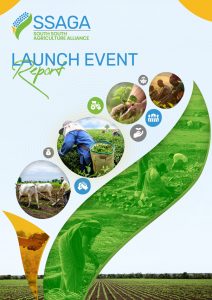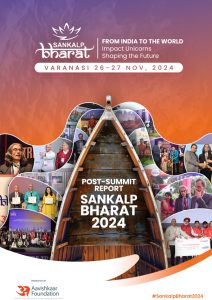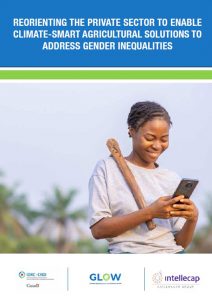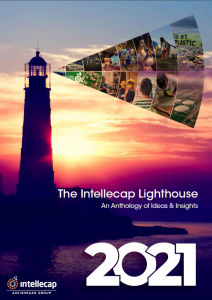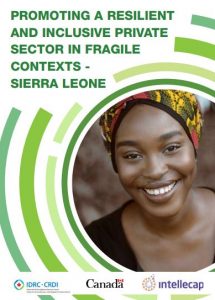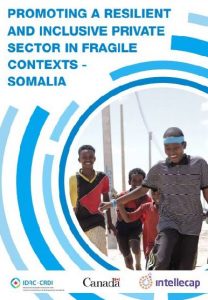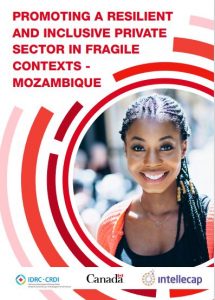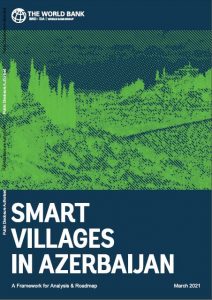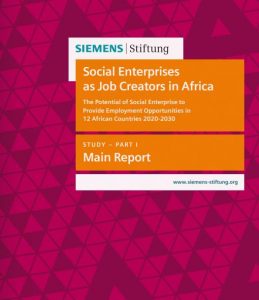TRENDING
-
SSAGA – Benefitting small-scale farmers by fostering innovations and collaboration across the Global South
Published: March, 2025 -
Sankalp Bharat 2024-Post Summit Report
Published: March, 2025 -
Reorienting The Private Sector To Enable Climate-smart Agricultural Solutions To Address Gender Inequalities
Published: February, 2025
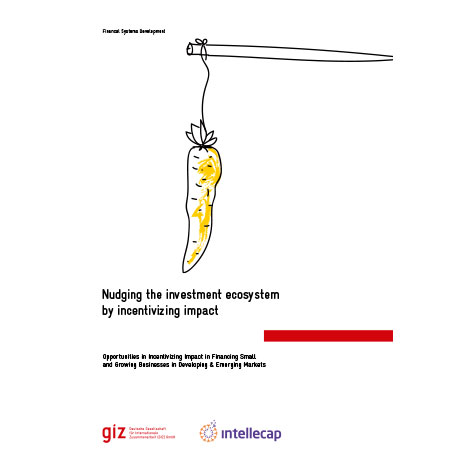
Nudging The Investment Ecosystem By Incentivizing Impact
PUBLISHED: June, 2018
Opportunities in Incentivizing Impact in Financing Small and Growing Businesses in Developing & Emerging Markets
This paper is a summary of fresh ideas on how to channel more capital into impact investing and incentivize impact creation. Building on insights generated by experts at the BMZ hosted conference Financing Global Development – Leveraging Impact Investing for the SDGs, the paper furthers the conversation on Impact Measurement and Management, IMM 2.0, through brainstorming practical ideas and viewpoints in the impact investing value chain: those who provide capital, those who manage it, and those who receive it. This included close to 50 stakeholders, including fund managers, DFIs, intermediaries, entrepreneurs, governments, CSOs and others.
The discussion, conducted in the form of a ‘design lab’ by Deutsche Gesellschaft für Internationale Zusammenarbeit (GIZ) GmbH, Intellecap, and the Swiss Agency for Development and Cooperation (SDC), aims to start a conversation on how to maximize impact by channeling capital into small and growing businesses (SGBs) as a way to expedite achievement of SDGs (Sustainable Development Goals). During the session, industry leaders like FMO, Vox Capital, and Roots of Impact had shared case studies of good practices in incentivizing impact along the investment chain. This formed the basis of brainstorming on development of new ideas on innovative instruments that could nudge the ecosystem towards more actively pursuing and scaling impact.
The result is an analysis of the barriers in the impact investment value chain highlighted during the stakeholder conversations, and key insights on how to overcome them (for example, the need for transparency, standardization, leadership, etc.). In addition, the workshop collated a list of potential ‘wild ideas’ to like impact currency, impact rewards, impact index, online market places for impact auctioning, and a give-back distribution impact support system, designed to incentivize increased levels of investment along the value chain. The practical approaches suggested by stakeholders fit well with the existing impact measurement and monitoring frameworks like GIIN’s IRIS and Intellecap’s PRISM and hold the potential to guide impact capital more efficiently by leveraging good practices.

The Financial Lives of Government Employees – Potential of Digital Finance in Sierra Leone
PUBLISHED: July, 2018
This report documents findings from research on the financial lives of government employees in Sierra Leone, commissioned by the Government to People Payments Project – Building Digital Ecosystem funded by USAID. Intellecap supported UNCDF, Government of Sierra Leone and Bank of Sierra Leone for conducting the research.
There are 80,000 government employees in Sierra Leone who receive salaries digitally in their bank accounts. Insights about their financial lives can help build a viable business case for DFS to expand access to a wide range of financial services for underserved communities in Sierra Leone. Such insights can inform strategies and use cases that the UNCDF and the Government of Sierra Leone can develop to promote DFS in the country. The National Strategy for Financial Inclusion 2017 – 2020 also refers to the need to identify and digitize use cases that will lead to habitual usage, and achieve Sierra Leone’s commitments to the ‘Better Than Cash Alliance’.
Recognizing the need and opportunity, UNCDF supported the Financial Lives Survey of government employees who receive their salaries digitally in Sierra Leone. Intellecap designed the survey to understand how government employees utilize salaries transferred into their bank accounts, their awareness of and access to DFS, avenues to use them and their perceptions about financial services and digital financial transactions. This report contains insights from the survey about potential customers of DFS and recommendations on use cases that could be piloted as an initial step to improve DFS adoption in Sierra Leone.
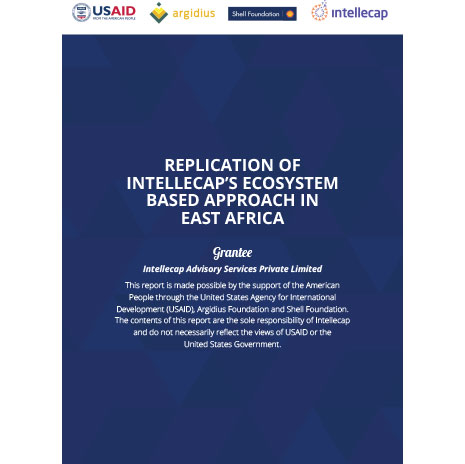
Replication of Intellecap’s Ecosystem Based Approach in East Africa
PUBLISHED: July, 2018
Intellecap has sought to replicate its ecosystem-based approach to East Africa by bringing
together capital, knowledge and networks to support SGBs at two levels: (i) provide direct support
to SGBs in the form of acceleration, fund-raising, technical assistance, innovation transfer, and
market linkages, and (ii) discover and engage critical ecosystem players such as corporations
(both local and international), accelerators, other development sector players in supporting SGBs.
In the three-year period since the launch of our initiative to replicate our ecosystem-based
approach for accelerating entrepreneurship support to SGBs in East Africa, we have received
generous support not only from our funders, but also from a number of local and international stakeholders such as development institutions, private sector entities, and industry associations.
Over the last year, we have replicated our advocacy platform (Sankalp), angel investment network
(I3N) advisory services (consulting & investment banking), virtual incubation platform
(StartupWave) and impact measurement platform (PRISM) as envisaged at the beginning of our
programmatic support. The development and adaptation of StartupWave for East Africa has
resulted in over 450 sign-ups for our early stage enterprise support activities and partnerships with
over 30 incubators / accelerators. Similarly, PRISM, our impact measurement platform, has
garnered interest from a wide variety of players to measure the impact of their programs.
All Publications
-
Circular+: Evidence for Inclusive Circular Business Models in the Indian
PUBLISHED: August, 2021Tags: #CircularApparel #SustainableFashion #Circular+ #CircularBusinessREAD MORE -
Waste-to-Value Startup Ecosystem: Opportunities for the Circular Approaches in East Africa : An Intellecap Publication, Supported by Bestseller Foundation
PUBLISHED: July, 2021Tags: Africa, Circular Economy, Sustainability, Waste Management, Intellecap AfricaREAD MORE -
Leading Tanzanian Women in Financial Services – An examination of gender equality in Tanzania’s financial services sector
PUBLISHED: June, 2021READ MORE -
Intellecap Lighthouse 3.0 – An Anthology of Thoughts & Insights (2021)
PUBLISHED: June, 2021READ MORE -
Promoting a Resilient and Inclusive Private Sector in Fragile Contexts – A case study of Sierra Leone by Intellecap
PUBLISHED: May, 2021READ MORE -
Promoting a Resilient and Inclusive Private Sector in Fragile Contexts – A case study of Somalia by Intellecap
PUBLISHED: May, 2021READ MORE -
Promoting a Resilient and Inclusive Private Sector in Fragile Contexts – A case study of Mozambique by Intellecap
PUBLISHED: May, 2021READ MORE -
Smart Villages in Azerbaijan – A Framework for Analysis and Roadmap
PUBLISHED: April, 2021READ MORE -
Social Enterprises as Job Creators in Africa – A 3 Part Siemens Stiftung Report. Enabled by Intellecap. 2020
PUBLISHED: April, 2021Tags: #IntellecapAfrica #SocialEnterprisesREAD MORE
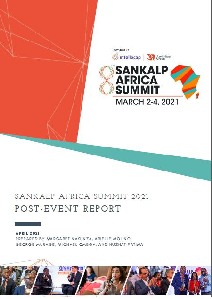
The Africa Summit 2021 Report
PUBLISHED: September, 2021
The Sankalp team embraced the move to a fully virtual platform for the Sankalp Africa Summit 2021. Primed by our first-ever virtual event, the Sankalp Global Summit 2020, we were prepared to leverage the virtual world for all it is worth. We were able to reach a more diverse audience than ever before and broke outside the East Africa limitations that are inherent with in-person events. We had viewership from nearly every country in Africa – for the first time, a truly African Summit.
We know that networking is the most important reason people come to Sankalp, and thanks to newly embraced technology, networking for participants was easier, and more strategic than whom you happened to bump into while standing in the coffee line. A virtual event was not without its challenges and key among them was programming for a global audience spread out across nearly 20 timezones. At our in-person events, we had numerous participants from the United States of America, Canada, and Europe, which prompted us to add late-night programming (Slumber Parties!) targeted at the international investment community and these were very well received.
We extended programming to three days, and filled every minute of it with structured networking opportunities, small group discussions, panels, workshops, deal rooms, and more – who said that virtual events are boring? We had a ton of fun, drank a lot of coffee (and a little champagne!), monitored a lot of internet traffic, managed hundreds of Zoom and Whereby sessions and breakout rooms, and hopefully changed the dynamic of virtual events for the future.
As we look to the future, we know that 1,000+ person physical events are probably not going to be possible any time soon – particularly in emerging markets, where vaccination rates remain low. If you joined us for the Africa Summit 2021, I hope we convinced you that virtual can be just as good as, if not better than, in person! If you didn’t participate this time around, we hope you will at our upcoming events. The Sankalp Global Summit 2021 is scheduled to take place virtually on October 12-14, 2021, and the Sankalp Africa Summit 2022 will take place (mostly) virtually from March 1-3, 2022.
Until we see you again, stay safe and stay healthy!

Circular+: Evidence for Inclusive Circular Business Models in the Indian
PUBLISHED: August, 2021
Textile waste from the global fashion industry is estimated to increase by about 60% between 2015 and 2030 to reach 148 million tons — equivalent to an annual waste of 17.5 kg per capita globally. For India, the problem of textile waste is two-pronged – 1. Waste from domestic manufacturing (pre-and post-production waste) and 2. Post-consumer waste imported from US and Europe for recycling, in addition to the waste generated in India. Estimates suggest that 10%-30% of fabric waste occurs at various stages of the textile production process in India. On the other hand, India is also a leading importer of used clothing and imported old clothes worth USD$ 182 million in 2013.
The sheer magnitude of negative environmental footprint of the textile industry points towards an urgent need for the industry to innovate and adopt circular economy practices. In India, circular practices have historically been a part of the culture, reflected in second-hand trading, tailoring, repair and customization as well as swapping, sharing and passing on clothes from one generation to the next to extend their usage. However, adoption of such practices has largely been informal. The mainstream textile and apparel industry until recently, exhibited little effort towards incorporating circular practices to shift from the existing linear models of production and consumption to alternate models that would help deliver on both planet and people positive outcomes.
While the need to address environmental risks remains the key motivator for the textile and apparel industry to accelerate the adoption of circular economy models, it is equally important for such models to factor in the human aspect. This is particularly relevant in the context of India where the industry employs around 45 million people across the value chain, a majority of them being women. Given the industry’s deep social implications on aspects such as gender equity, economic parity and the future of work, it is imperative for initiatives focusing on circularity to be designed to further social inclusion.
In 2019 Circular Apparel Innovation factory (CAIF) launched Humans of Circularity (HoC), a Working Group that convenes stakeholders of the Indian textile and apparel industry on collaboratively driving the agenda around a ‘just & fair’ transition towards circularity – balancing economical & environmental sustainability while delivering positive social outcomes.
Project Circular+ was launched as a Sub-Working Group within HoC, with support from the Laudes Foundation with the objective of exploring how circular business models in the Indian textile and apparel industry can be designed to deliver social inclusion and impact at scale.
With the successful completion of the project, this report captures lessons from the design and implementation of the project as well as industry-level insights that have been captured from the Working Group deliberations.
The first section presents a repeatable approach and methodology to surface inclusive circular business models that can inform the design of future initiatives. The section provides a detailed overview of the project design and approach along with methodologies used to drive a highly collaborative and sustained co-creation process with a diverse set of ecosystem stakeholders.
The second section includes insights generated from the Circular+ Working Group which served as a platform for knowledge exchange amongst a diverse set of industry stakeholders to create a shared and unified understanding of the circular business models landscape in India and beyond. The section contains insights on the role and current state of a set of circular business models in India, associated gaps and challenges, and explores the whitespaces and opportunities for scaling their adoption.
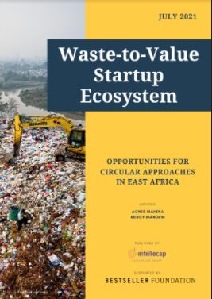
Waste-to-Value Startup Ecosystem: Opportunities for the Circular Approaches in East Africa : An Intellecap Publication, Supported by Bestseller Foundation
PUBLISHED: July, 2021
Sub-Saharan Africa generated an estimated 174 million tonnes of waste in 2016, at a rate of 0.46 kg per capita per day, and is projected to be the world’s fastest-growing waste-generating region by 2050. The continent finds itself struggling to achieve adequate waste management and disposal practices to keep up with the growing population and production. Waste management is, therefore, a key to the socioeconomic and environmental challenges affecting most countries on the continent. Traditional recycling and disposal methods have proven to be inefficient, leading to calls for a stronger focus on circularity and resource efficiency. There is therefore much to be done through private and public sector collaboration along the waste management value chain to ensure that countries meet their waste management targets and create sustainable solutions. Various innovative startups have established themselves in the sector to address some of the major waste management challenges, resulting in an increasingly vibrant ecosystem compared to ten years prior.
It is on this backdrop that The BESTSELLER Foundation launched the first ever waste-to-value accelerator in East Africa that was being implemented and managed by Intellecap. The objective of the accelerator was to support and scale early-stage businesses tackling waste management and recycling in the region. The accelerator sort to build a pipeline of startups in the sector (through designing a challenge program), provide tailored business development and investment readiness support to selected enterprises as well as build strong networks for the startups including advisory boards, mentors and investors to enable the startups to thrive and scale.
Through these efforts, Intellecap developed a pipeline of 249 early-stage companies that operate within the sector, both from the waste-to-value accelerator and through support from the Sankalp awards program. These companies were analyzed in order to understand their business models, they type of circularity innovation model adopted, the geographies in which they operate, their stage of operations, their sources of capital among others. Similarly, Intellecap assessed the gap and challenges that these startups face in the region and some of the opportunities that can be leveraged to scale these startups. Further, Intellecap analyzed the level of tailored support that is given to these companies including the available incubation and acceleration programs that have been launched in the region, funding sources that can be leveraged by such companies and the availability of both national and regional advisory bodies that aggregate and support startups in the sector.
This white paper therefore presents an overview of the waste sector in East Africa with a focus on waste-to-value startups. The findings highlights gaps, opportunities, and potential solutions that could accelerate the growth of the ecosystem.

Leading Tanzanian Women in Financial Services – An examination of gender equality in Tanzania’s financial services sector
PUBLISHED: June, 2021
In 2019, IFC launched the Finance2Equal Tanzania initiative to examine the roles men and women play in the financial services sector and identify ways to reduce gender gaps and enhance women’s access to opportunities in the sector. Through Finance2Equal Tanzania, IFC has established a partnership with five Tanzanian financial services companies to reduce gender gaps in their operations.
This report, as part of Finance2Equal Tanzania, gathered data and assessed employees’ perceptions of practices that enable and/or limit gender diversity in the workforce. The quantitative analysis was complemented by a qualitative analysis of 22 women leaders in Tanzania’s financial services sector. Through their personal stories, these women provide insights about the challenges they encountered, the strategies they used to overcome these, and the actions they have taken to help the next generation of women to rise.
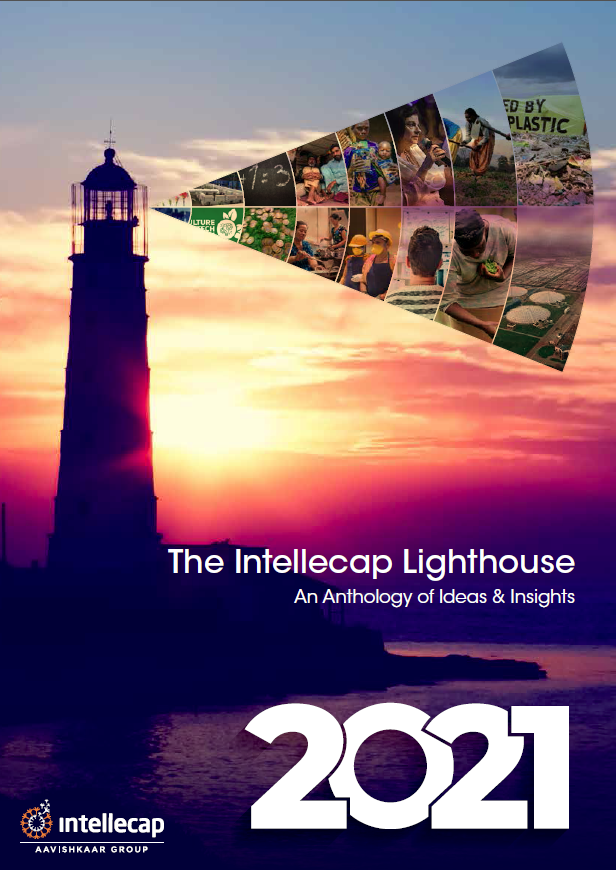
Intellecap Lighthouse 3.0 – An Anthology of Thoughts & Insights (2021)
PUBLISHED: June, 2021
Since 2002, Intellecap has constantly strived to shape outcomes in emerging and underserved markets by developing key insights and new ideas. As a result, the organization has undertaken bold initiatives across its various practices to push the envelope, seeking to build collaboration and thought leadership as part of the social impact discourse.
This year marks the 3rd edition of the Lighthouse, and there’s been a concerted effort to bring more diverse, yet unique perspectives to the sectors Intellecap covers, and this year, we’ve gone a step ahead to also feature our most prominent multi-sectoral Case Studies from the year. The goal of this endeavour has always been to highlight and share the most relevant thought pieces with our external stakeholders, in order to drive across sustainable solutions that bring the collective a step closer towards achieving the SDG’s, as set forth by the United Nations.
Some of this year’s published pieces cover a diverse spectrum, including the role of angel investing during Covid, a discussion on the contentious Farm Laws in India, private sector’s participation in achieving sanitation solutions, the journey of textile waste, and impact becoming a part of mainstream discourse, among others. This compilation of knowledge pieces has contributions featured in some of the most prestigious media publications, and bears testament to their importance and contemporary nature in these present times.
While large parts of the World continue to grapple with the effects of the Covid pandemic, this period has offered all of humanity a unique opportunity to deeply reflect and reboot itself in the most prudent and innovative manner, and emerge much stronger on the other side of this global epidemic. It is our sincere hope that the Lighthouse offers you more than a glimpse into some of the most compelling geographies and sectors Intellecap serves as part of its key constituents, and aspires to continue serving in the years to come.

Promoting a Resilient and Inclusive Private Sector in Fragile Contexts – A case study of Sierra Leone by Intellecap
PUBLISHED: May, 2021
To showcase business and investment opportunities in fragile countries, there is a need to bridge the knowledge gap & create an opportunity mapping. There is still very limited information available on the social entrepreneurship and impact investing ecosystems in fragile countries. More so, in-depth mappings on the various sectors and stakeholders involved are almost non-existent. Through the provision of key data points and insights, this can shed light on the investment opportunities in these countries. Although private sector investments are currently low in these fragile countries, their economies are growing and ripe for anyone willing to take the risk to invest.
This research report seeks to provide insights into the current state of the impact investing and entrepreneurship ecosystem in Sierra Leone and recommendations on impact investment models and ecosystem building strategies to build a resilient and inclusive private sector in Sierra Leone . The report maps the activities of a diverse pool of impact investors across Sierra Leone and highlights opportunities to increase the impact of capital flowing into the private sector. It also provides an assessment of the stakeholders requiring impact capital, such as social enterprises, and the ecosystem enablers in the impact investment sector. This report is one of a series of three; focusing on fragile and transition countries in Africa, with the other two being on Mozambique and Somalia.
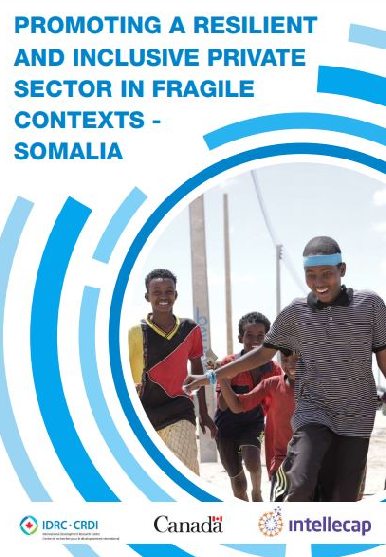
Promoting a Resilient and Inclusive Private Sector in Fragile Contexts – A case study of Somalia by Intellecap
PUBLISHED: May, 2021
To showcase business and investment opportunities in fragile countries, there is a need to bridge the knowledge gap & create an opportunity mapping. There is still very limited information available on the social entrepreneurship and impact investing ecosystems in fragile countries. More so, in-depth mappings on the various sectors and stakeholders involved are almost non-existent. Through the provision of key data points and insights, this can shed light on the investment opportunities in these countries. Although private sector investments are currently low in these fragile countries, their economies are growing and ripe for anyone willing to take the risk to invest.
This research report seeks to provide insights into the current state of the impact investing and entrepreneurship ecosystem in Somalia and recommendations on impact investment models and ecosystem building strategies to build a resilient and inclusive private sector in Somalia. The report maps the activities of a diverse pool of impact investors across Somalia and highlights opportunities to increase the impact of capital flowing into the private sector. It also provides an assessment of the stakeholders requiring impact capital, such as social enterprises, and the ecosystem enablers in the impact investment sector. This report is one of a series of three; focusing on fragile and transition countries in Africa, with the other two being on Sierra Leone and Mozambique.
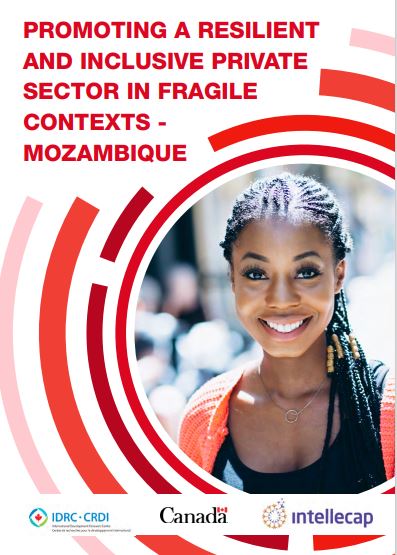
Promoting a Resilient and Inclusive Private Sector in Fragile Contexts – A case study of Mozambique by Intellecap
PUBLISHED: May, 2021
To showcase business and investment opportunities in fragile countries, there is a need to bridge the knowledge gap & create an opportunity mapping. There is still very limited information available on the social entrepreneurship and impact investing ecosystems in fragile countries. More so, in-depth mappings on the various sectors and stakeholders involved are almost non-existent. Through the provision of key data points and insights, this can shed light on the investment opportunities in these countries. Although private sector investments are currently low in these fragile countries, their economies are growing and ripe for anyone willing to take the risk to invest.
This research report seeks to provide insights into the current state of the impact investing and entrepreneurship ecosystem in Mozambique and recommendations on impact investment models and ecosystem building strategies
to build a resilient and inclusive private sector in Mozambique. The report maps the activities of a diverse pool of impact investors across Mozambique and highlights opportunities to increase the impact of capital flowing into the private sector. It also provides an assessment of the stakeholders requiring impact capital, such as social enterprises, and the ecosystem enablers in the impact investment sector. This report is one of a series of three; focusing on fragile and transition countries in Africa, with the other two being on Sierra Leone and Somalia.

Smart Villages in Azerbaijan – A Framework for Analysis and Roadmap
PUBLISHED: April, 2021
This paper is the main output of an analytical and research program aimed at identifying policy options to develop technology and social innovation driven smart village approaches that can improve service delivery and local economic development in rural areas. The concept of smart villages focuses on enabling communities – in partnership with local government and the private sector – to identify opportunities and solutions that are right for their own areas based on demand (bottom-up and participatory needs assessment), on transferring knowledge and innovation, and on policy incentives.
With these three elements in place, customized smart solutions for rural areas can result in greater local economic development with better connectivity and improved services, increased livelihoods and incomes, and improved quality of life. The paper is presented in six sections, each representing an element of the research and analysis undertaken to define and apply the concept of smart villages in Azerbaijan.
The first section presents the context of rural development, particularly aspects which relate to the rural-urban divide, public policies, and programs aimed at advancing rural development, as well as the digital dimensions of development. The second section introduces the concept of smart villages. What does this mean? How do other countries apply this term? What are the core principles and elements? Following from the definition and global examples of smart villages, the paper lays out a framework for assessing the smart village readiness of villages in Azerbaijan, viewing them as spatial clusters and drawing on global big data and national data sources to rank village clusters with common spatial characteristics as the most versus the least ready to apply smart village approaches.
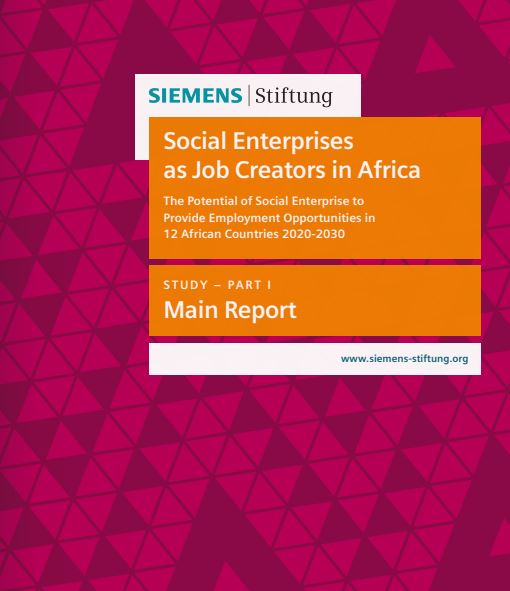
Social Enterprises as Job Creators in Africa – A 3 Part Siemens Stiftung Report. Enabled by Intellecap. 2020
PUBLISHED: April, 2021
‘Social Enterprises as Job Creators in Africa – The Potential of Social Enterprise to Provide Employment Opportunities in 12 African Countries 2020-2030’ estimates that, by 2030, 1 million new jobs can be created in Africa based on a comprehensive analysis looking at 12 selected countries in the region. However, interventions are needed now in order to support impact-oriented social enterprises (SEs) in creating such jobs.
The study looked at job creating, as well as job inhibiting, factors for SEs based on different country contexts, in addition to demographic perspectives related to the African job market and the quantification of SE job creation potential in each country of focus. At a micro level, case studies on 5 SEs operating in different African countries and in different sectors has been conducted to identify individual supporting or inhibiting conditions for job creation in particular. The results have been used to recommend a set of interventions that would support SE job growth in Africa, including: financial support, technical support, improvements to the enabling environment, and improvements to moderate data availability. Siemens Stiftung is convinced of the concept of social entrepreneurship and the roles that impact-drive entrepreneurs play in improving living conditions. The foundation urges players in the international development ecosystem to support SEs in an effort to meet the demand of these immense challenges.
The study has been conducted and published by Siemens Stiftung and was funded by the Special Initiative on Training and Job Creation of the German Federal Ministry for Economic Cooperation and Development (BMZ), implemented by Deutsche Gesellschaft für Internationale Zusammenarbeit (GIZ). The report was enabled by Intellecap.
It is published as a trilogy that comprises of: The Main Report, Country Profiles, and Case Studies.
Reports & Policies
Our Impact Map

Sign up for our newsletter
© Copyright 2018 Intellecap Advisory Services Pvt. Ltd. - All Rights Reserved



